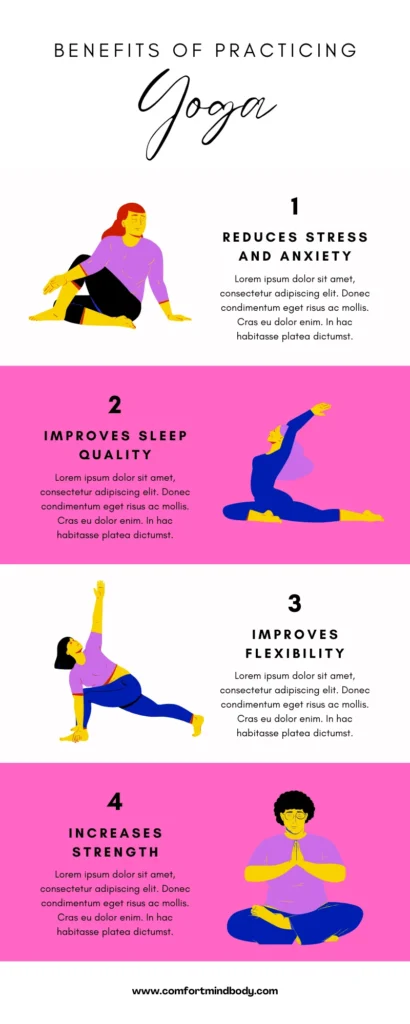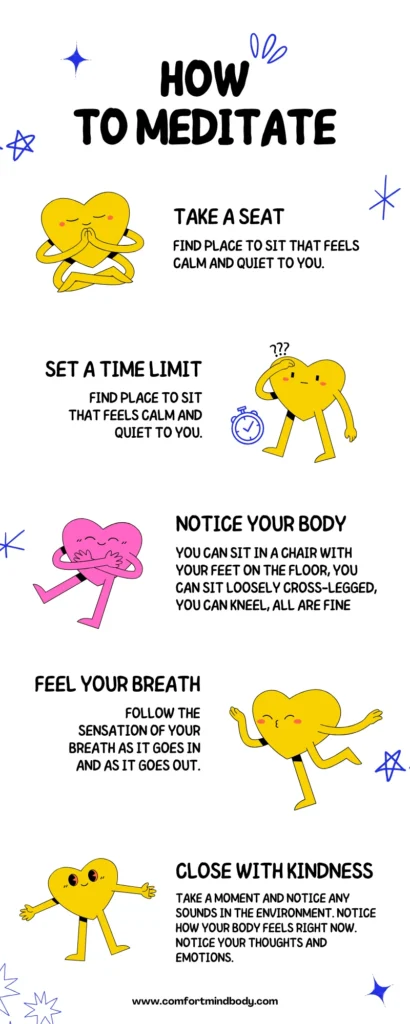Table of Contents
ToggleIntroduction:
What Are The Best Meditation Types That Can Help Treat Depression? The practice of meditation has been used for centuries in India and China. This method shows promise as a therapy for depression.
Many types of meditation aim to improve focus. This can greatly help people with depression and anxiety. Understanding how to operate your thoughts takes time, strength, and commitment.
Remember, starting a meditation practice does not mean you should stop taking your medications or other treatments for depression. Meditation, particularly mindfulness meditation, has been shown to help treat depression.
It should be used as part of regular medical care under a doctor’s supervision. It is not a substitute for regular medical care.


Yoga
Best Meditation Types That Can Help Treat Depression
Yoga, an ancient practice and meditation, has become increasingly famous in today’s busy society. For many people, yoga delivers a retreat from their chaotic and active lives. This is true no matter where you practice yoga.
It could be on a mat in your bedroom. It could be in an ashram in India. Or it could be in Times Square, New York City. Yoga gives many different mental and physical benefits. Yoga combines physical postures with breathing methods and meditation, and it seems to affect depression and anxiety.
Studies have established that Kundalini yoga, in particular, which incorporates chanting, helps treat many disorders. Kundalini yoga includes specific techniques to manage fear, banish anger, and replace negative thoughts with positive ones.
Talk to your doctor before starting yoga. Unlike meditation, which is generally safe, yoga can cause injury, although this isn’t common. Make sure you practice yoga with a qualified instructor.
Walking meditation
Best Meditation Types That Can Help Treat Depression
Walking, of course, is useful for both your physical and mental health. But a walking meditation may take you to another level. Aerobic walking and Buddhist meditation three times a week for 12 weeks helped reduce depression.
It also improved flexibility and balance in a small group of older adults in one study. For many people, slow, formal walking meditation is an acquired taste. But the more you practice, even for short periods, the more it is likely to grow on you.
Remember, you can practice mindfulness while walking at any speed in your daily life. You can also do this while running, but your pace will change your steps and breath. You can try to bring awareness to everyday activities. This helps you feel present in each moment as your life unfolds.
Repetitive activity
Best Meditation Types That Can Help Treat Depression
Cleaning may not be a formal meditation, but it can help you feel calm. Scrubbing pots and pans can create a peaceful state of mind if you do it with focus. One study supports this idea. It found that “mindful dishwashers” were more mindful and less nervous than those who did not wash up mindfully.
It’s the repetitive action that doesn’t require any real thought. It’s the same as physical exercise. You use exercise or manual labor to calm your mind. It helps you focus and clear out extra thoughts that we all have during the day.
Chanting
Best Meditation Types That Can Help Treat Depression
Many meditation traditions use chanting or periodic chimes of a gong as a way to focus the mind. Chanting is a modality to arrive at the same type of meditative state. One study found that “active meditative practices” like chanting and yoga can activate certain areas. These areas help with mood and emotional control.
Visualization
Best Meditation Types That Can Help Treat Depression
Different people learned that concentrating on pleasant portrayals rather than negative ones stimulates peace. One of the best types of meditation for treating depression is visualization. This can be guided by someone else, or you can lead your session.
There are many recordings available online to help you. Imagery can similarly be utilized to shift how you recall negative memories. Imagining happy endings instead of bad memories can improve life and self-esteem. This was shown in at least one study.
Breath awareness meditation
Best Meditation Types That Can Help Treat Depression
Awareness of your breath is an essential element of many different forms of meditation, particularly mindfulness meditation. Mindfulness meditation utilizes the object of your breath to concentrate on, to help with mind activity. Breath awareness meditation may also be called mindful breathing.
Just 15 minutes a day of deep breathing can improve your mood. It can help you feel less emotional. And you don’t necessarily have to set aside personal time to pay attention to your breathing.
Multiple people find ways to integrate awareness of their breath throughout the day. It can be done sitting, standing, or lying down, and with your eyes open or closed.
Mindfulness meditation
This is a subset of mindfulness meditation that blends meditation with cognitive behavioral therapy or CBT. CBT is a popular type of therapy for depression. It focuses on changing harmful thoughts and behaviors. MBCT was first cultivated to prevent relapses in people with recurrent depression.
More recent information indicates that it may also assist people with active depression. A recent study looked at behavioral activation with mindfulness. This method combines therapy with mindfulness practice. The study found it reduced depression symptoms. These symptoms include changes in sleep, appetite, and mood.
Mantra Meditation
Mantra is a Sanskrit term, with “man” meaning “mind” and “tra” meaning “release.” Think of a mantra like a word or phrase you repeat during meditation as a tool to help release your mind. It can make a big difference, especially if you have trouble focusing or getting in the right mindset.
Numerous people have discovered that using a mantra can improve attention and promote concentration. Since it assists you in staying focused, it could lead to improved outcomes from meditation.
Help Treat Yourself
- Increased Self-awareness: Meditation helps you reflect on yourself. This leads to a better understanding of your thoughts and feelings. As a result, it improves your decision-making.
- Reduced Anxiety: By promoting relaxation and mind calmness, meditation helps in managing thoughts, significantly reducing anxiety.
- A Greater Sense of Peace: Focusing on the present moment through meditation helps create a peaceful mind. It allows you to let go of past regrets and future worries.
- Increased Self-compassion: Meditation cultivates a non-judgmental awareness, leading to increased kindness towards oneself and others.
- A More Positive Attitude: Regular practice helps manage stress, fostering an optimistic outlook even amidst challenges.
- Enhanced Resilience: Meditation builds a resilient mind, better equipped to cope with life’s adversities.
- Improved Physical Health: Benefits extend to physical health, including lowered blood pressure, better sleep, and a strengthened immune system.
- Enhanced Concentration and Focus: Practices like Mantra meditation improve concentration, boosting productivity and performance.
- Spiritual Growth: Meditation can be a pathway to exploring deeper states of consciousness and spiritual connection.
- Improved Relationships: The self-awareness and compassion gained through meditation contribute to enriched interpersonal relationships.
Incorporating meditation as a part of a holistic approach to managing depression can be a transformative experience. It’s important to explore these practices with professional help. This ensures a safe and helpful journey to better mental health.
Affiliate Disclosure:
The links contained in this product review may result in a small commission. This goes towards supporting our research and editorial team and please know we only recommend high-quality products.
Note: This article is for informational purposes only and is not intended to diagnose, treat, or cure any disease. Always consult a healthcare professional before taking any supplement or making any changes to your diet or lifestyle.
Resources:
- How to Meditate – Mindful.org
- Daily Calm | 10 Minute Mindfulness Meditation | Be Present – YouTube
- Meditation – Wikipedia
- 5-Minute Meditation You Can Do Anywhere – YouTube
- Meditation: What It Is, Benefits & Types – Cleveland Clinic
- Meditation: A simple, fast way to reduce stress – Mayo Clinic
- A Guide on How to Meditate for Stress Reduction and More – Everyday Health
- What is Meditation – Headspace
- Meditation and Mindfulness: What You Need To Know | NCCIH




